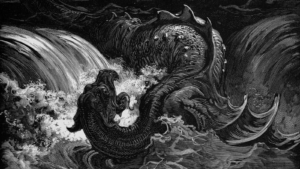You have turned my mourning into dancing!
You stripped off my sackcloth and clothed me with joy. –PsalmA psalm is a song of praise. In the Old Testament 150 psalms comprise the psalter, although some of the psalms are laments and thanksgivings. In the New Testament early Christians gathered to sing psalms and hymns and spiritual songs. More 30:11
One of my favorite teachers, Professor James Armstrong of Princeton Theological Seminary, used to say, “We teachers don’t have favorites … and Dave Janzen is one of them.”
I feel the same way about the Bible. I was recently asked to blog about my favorite Bible passage. But there are so many breathtaking, earth-shattering, life-changing passages in the Scriptures, how could I possibly name one favorite? And each striking passage — like a single petal on a rose bush full of blossoms — is only truly beautiful in the context of the whole.
You might as well ask me to pick a favorite guitar chord — each chord is only truly meaningful as part of the progression that makes up the song and the set list.
As a student and lover of the Bible, I don’t have favorite passages … and Psalm 30 is one of them. It is a favorite because it speaks for me. It gives me the words to sing my song.
The Report, Part 1: He Lifted Me!
The psalm begins with a report. The report comes in the form of word of praise confessing an experience of divine rescue. The psalmist praises God and reports how:
I raise you up, O Lord, for you have drawn me up,
you did not let my foes rejoice over me!
O Lord my God, I cried to you for help,
and you healed me!
O Lord, you lifted me right out of the earth,
and gave me new life instead of letting me sink down. (author’s translation)
Now I don’t know about you, but I’ve been there, teetering on the edge of eternity, with one foot already buried in the ground. Or, in my case, both feet already buried.
A couple of times in high school as a teenager when I was fighting cancer, some of the community around me had pretty much given up on my chances of making it. I didn’t have favorite teachers in high school, but Herr Rockey, our German teacher, was one of them.
When I was first diagnosed with cancer, he came over to my house and he gave me a gift: an ugly, maroon, Gore-Tex-and-Velcro wallet, with a 5-Mark German bill in it. He said, “When you’re a high-school senior, our class will go to Germany. You’ll bring this wallet and this bill on the trip.”
More than two years — and a great many hospitalizations and surgeries — later, when we were on that senior-class trip to Germany and I showed him that ugly wallet and the 5-Mark bill, he confessed to me, “I didn’t believe it. I thought you would never make it.” He, and other smart people, had almost given up on me.
He didn’t really give up on me. Not fully. My mom and dad hadn’t given up on me. My sisters and brothers hadn’t given up on me. My friends, the medical staff at Mayo Clinic and my church hadn’t given up on me. And God. God didn’t give up on me. God pulled me through. O Lord my God, I cried to you for help and you healed me!
The Invitation: Join Me!
Back to Psalm 30.
Following the report, the psalmist then issues an invitation. An invitation in the form of call for the community to join the praise — “Come join the choir,” the psalmist says, “lift up your voice, because God has lifted me!”
Sing to the Lord, O his faithful ones!
Confess! So that his holiness might be remembered!
For his anger is momentary,
But in his favor there is a lifetime of life!
Weeping might overnight for an evening,
but in the morning: Joy! (author’s translation)
Now this call to praise isn’t just a generic, normal, harmless call to praise. You know, “Higher, higher, higher, higher, higher, higher, higher, higher, higher, higher, lift JesusJesus is the Messiah whose life, death, and resurrection are God's saving act for humanity. More higher!” This is a specific call to praise God because God had lifted the psalmist up from the grave. “Sing to the Lord, O his faithful ones,” the psalmist cries.
“You have drawn me up,” the psalmist confesses, “you lifted me right out of the earth.” And because of that, he says to the community, “Sing to the Lord!”
The Report, Part 2: “To you, O Lord, I Cried”
Then the psalmist recalls both the old, pre-crisis feeling of invulnerability as well as the plunge into the depths of the crisis.
As for me, when things were easy, I said,
“I’ll never get shaken up.”
In your favor, O Lord,
you had established me as a strong mountain.
Then you hid your face;
I was dismayed.
To you, O Lord, I cried,
and to the Lord I made supplication:
“What profit is there in my death?
If I go down to the pitA pit is a hole or a cavity in the ground. While a pit can be actual in the Bible, it is often a metaphor for separation or abandonment. The Psalms frequently speak about going down to the pit, a place from which - it... More,
Will the dust praise you?
Will it tell of your loving faithfulness?
Hear, O Lord! Show my some graceGrace is the unmerited gift of God's love and acceptance. In Martin Luther's favorite expression from the Apostle Paul, we are saved by grace through faith, which means that God showers grace upon us even though we do not deserve it. More!
O Lord, be my helper!” (author’s translation)
It is interesting that the psalmist twice recalls what was on his or her tongue.
First, there was the pre-crisis feeling that everything is going pretty well: “When things were easy, I said, ‘I’ll never get shaken up.’”
But that was before. Before “you hid your face.”
When my son Gunnar was young, he liked to play a form of old “object-permanence” game most kids like to play. He would cover his face up with a blanket and ask, “Where Gunnar go?” Then he’d pull down the blanket and joyfully exclaim, “There he is!” Then — because he was two years old — he would do it again. “Where Gunnar go?” “There he is!” And again. And again.
The psalmist had experienced a reverse instance of the Where-Gunnar-go-object-permanence discovery.
God had always been there for the psalmist. At the right hand. In the passenger seat. Almost near enough and present enough to touch.
And then, well, God was gone. “You hid your face.”
But the psalmist remembered those old Sabbath-school lessons about MosesProphet who led Israel out of Egypt to the Promised Land and received the law at Sinai. More and MiriamMoses' and Aaron's sister who danced after the exodus. More, DeborahAn Israelite prophetess and influential judge. More and Ehud, HannahThe mother of the prophet Samuel. More and SamuelThe judge who anointed the first two kings of Israel. More. About how the ancestors “cried to the Lord and the Lord heard their prayer.”
So the psalmist gave it a go: “Hear, O Lord! Show me some grace!” And God did. The psalm doesn’t describe in precise terms exactly what the crisis was. Maybe it was illness, or injury, or debt, or war, or deportation, or depression, or loneliness, or the death of a loved one, or crop failure, or a drought, or divorce, or a house-fire.
Nor does the psalm describe what form God’s grace took. Maybe it was healing, or a gift of money, or peace, or security, or rescue, or a gentle rain, or a new love. Or maybe it was a high-school German teacher coming over with an ugly gift.
Mourning into Dancing
Having offered a sacrificeSacrifice is commonly understood as the practice of offering or giving up something as a sign of worship, commitment, or obedience. In the Old Testament grain, wine, or animals are used as sacrifice. In some New Testament writings Jesus' death on the cross as the... More of praise in the form of testimony, Psalm 30 closes with one of the most beautifully heart-aching sentences in the entire Bible:
You have turned my mourning into dancing!
you stripped off my sackcloth and clothed me with joy,
So that glory itself sings about you and is not silent,
O Lord my God, I will praise you forever. (author’s translation)
What an incredibly beautiful line: “You have turned my mourning into dancing! You stripped off my sackcloth and clothed me with joy!”
I am not exactly sure how to picture that — a person “clothed with joy.” But I’ve seen it. I’ve seen it in the lives of so many of God’s people who God has visited with grace.
And I’ve lived it. I’ve lived a life of being clothed with joy, even as I roll around in my wheelchair with no legs.
If the good Lord ever has a business card printed up, I bet that is what it will say:
Jesus of Nazareth, the Son of God
Mourning into Dancing
Sackcloth into Joy
On our behalf, Jesus undertook a journey to Jerusalem — a journey that ended with him stripped bare, hanging naked on the cross. Through his death and resurrection and through our baptisms into his death and resurrection, we have all been clothed in Christ. The Lord has taken off our sackcloth and clothed us with joy.
I still have that ugly, Gore-Tex, maroon wallet. I carry it every day. It reminds me of an important teacher in my life. And it reminds me of getting through the bad times with God’s help. And it reminds me that my mourning has been turned to dancing.




